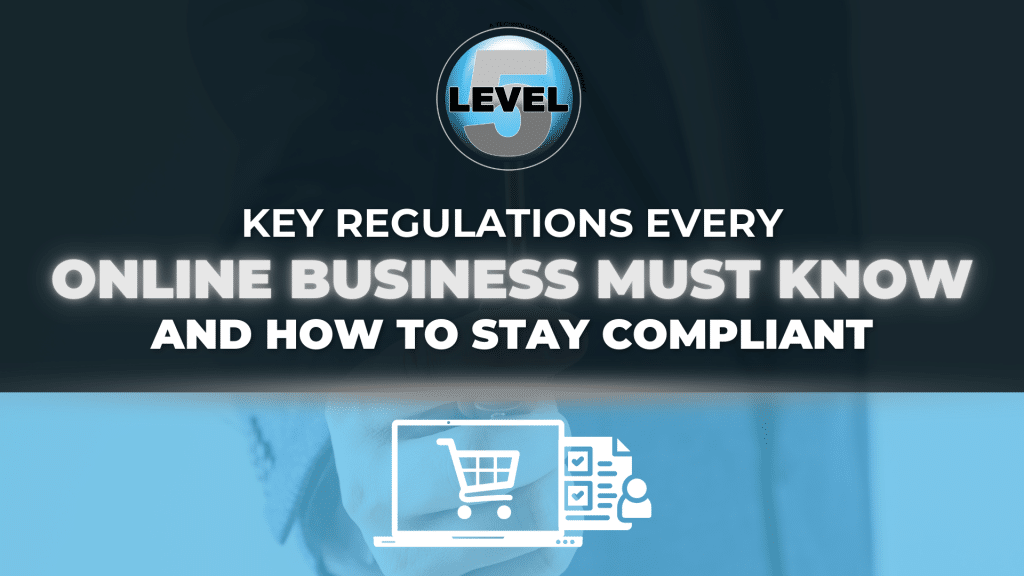There has never been a more exciting or challenging time to run an online business. There are many opportunities for expansion, innovation, and worldwide reach in the booming digital marketplace. However, given the laws designed to protect customers and their data, online businesses must fulfill their obligations. In addition to being dangerous, breaking these rules can have serious repercussions that could deplete resources and harm reputations.
From state-specific laws like Florida’s FIPA to data privacy standards like the GDPR, businesses must know the rules and how to comply with them. This blog post will break down key regulations, highlight the importance of user authentication, and explore how compliance management solutions can help you stay ahead.
Understanding the Regulatory Landscape for Online Businesses
Online businesses must deal with various national, state, and international regulations. Cybersecurity, consumer protection, accessibility, and data privacy are critical regulatory concerns. The following are some of the most important laws that now impact businesses:
1. General Data Protection Regulation (GDPR)
Despite being a European Union law, GDPR applies to any company that gathers data from EU citizens. This rule strongly emphasizes user consent, openness in data collecting, and strict security protocols to safeguard private data.
2. California Consumer Privacy Act (CCPA)
The CCPA give Californians control over their data and establish a high bar for data privacy in the US. Important clauses include the right to know what information is gathered, the right to have that information deleted, and the right to refuse
3. Florida Information Protection Act (FIPA)
Specific to Florida, FIPA governs the protection of personal information for residents. Businesses must notify affected parties within 30 days of a data breach. Penalties for non-compliance include fines of up to $500,000, depending on the severity of the violation.
4. Americans with Disabilities Act (ADA)
Companies with an online presence must ensure that people with disabilities can access their websites. As seen in the well-known Domino’s Pizza v. Robles case, when the business was sued for failing to create a website accessible to visually challenged users, non-compliance can result in legal action.
Risk Management vs Compliance: What’s the Difference?
t’s common for business owners to mix up risk management vs. compliance tasks. However, it’s crucial to grasp their roles:
- Risk Management in business requires the recognition of threats. They are taking steps to minimize their impact before they occur.
- Compliance is essential for a business to meet its legal obligations, as it follows established rules and guidelines.
For example, implementing user authentication for online businesses deals with two aspects: it minimizes the possibility of unauthorized access (risk management). It guarantees compliance with data privacy regulations such as GDPR (compliance).
The Role of Compliance Management in Online Businesses
The systematic process of making sure your company complies with all relevant legislation is known as compliance management. This involves policies, tools, and strategies that monitor and enforce compliance.
Critical Components of Compliance Management
- Policy Documentation: Clearly define and communicate compliance policies to employees.
- Employee Training: Educate your team on regulations and their role in compliance.
- Technology Integration: Automate reporting and monitoring using compliance management solutions.
- Regular Audits: Conduct audits regularly to find and fix compliance shortcomings.
How Online Businesses Can Stay Compliant
To ensure your business remains on the right side of the law, follow these actionable steps:
1. Invest in Compliance Management Solutions
Tools like LogicGate and OneTrust provide consolidated reporting, real-time monitoring, and automated workflows to make compliance easier. These solutions help track changes in laws and adjust your processes accordingly.
2. Strengthen User Authentication
The importance of user authentication cannot be overstated in today’s cybersecurity landscape. Multi-factor authentication (MFA) reduces the risk of breaches and helps comply with data protection regulations like FIPA and GDPR.
3. Conduct Regular Training
Give your staff the information and abilities they need to maintain compliance. Workers should be aware of the subtleties of cybersecurity procedures, accessibility guidelines, and data privacy legislation.
4. Leverage Compliance Management Resources
Industry-specific guidelines and government websites like the Federal Trade Commission provide insightful information. Additional compliance management resources may be available through membership in trade associations such as the International Association of Privacy Professionals (IAPP).
5. Monitor and Update Policies
Regulations evolve, and your policies should, too. Regularly review your compliance framework to address new legal requirements.
The Path to Seamless Compliance
Compliance is a strategic advantage as well as a legal obligation. Online companies may secure their operations, maintain customer trust, and stay out of trouble by putting compliance management first and taking preventative action.
Make the appropriate tool investments, train your staff, and keep up with evolving regulations. You can successfully and confidently negotiate compliance difficulties with the correct strategy. Remember that compliance is a continuous dedication to conducting business ethically.
Are you looking for expert guidance to streamline your compliance strategy? Level 5 Management specializes in providing tailored compliance management solutions and resources to ensure your business stays compliant and thrives in today’s competitive landscape. Contact Level 5 Management today to take your compliance efforts to the next level.


